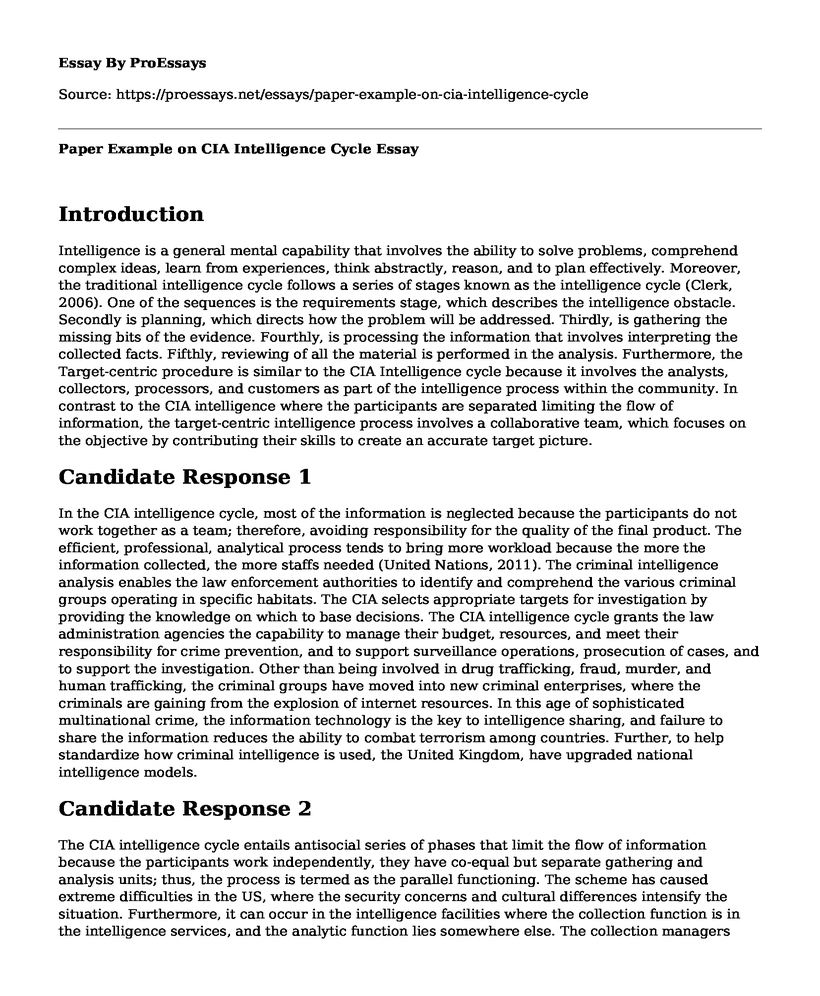Introduction
Intelligence is a general mental capability that involves the ability to solve problems, comprehend complex ideas, learn from experiences, think abstractly, reason, and to plan effectively. Moreover, the traditional intelligence cycle follows a series of stages known as the intelligence cycle (Clerk, 2006). One of the sequences is the requirements stage, which describes the intelligence obstacle. Secondly is planning, which directs how the problem will be addressed. Thirdly, is gathering the missing bits of the evidence. Fourthly, is processing the information that involves interpreting the collected facts. Fifthly, reviewing of all the material is performed in the analysis. Furthermore, the Target-centric procedure is similar to the CIA Intelligence cycle because it involves the analysts, collectors, processors, and customers as part of the intelligence process within the community. In contrast to the CIA intelligence where the participants are separated limiting the flow of information, the target-centric intelligence process involves a collaborative team, which focuses on the objective by contributing their skills to create an accurate target picture.
Candidate Response 1
In the CIA intelligence cycle, most of the information is neglected because the participants do not work together as a team; therefore, avoiding responsibility for the quality of the final product. The efficient, professional, analytical process tends to bring more workload because the more the information collected, the more staffs needed (United Nations, 2011). The criminal intelligence analysis enables the law enforcement authorities to identify and comprehend the various criminal groups operating in specific habitats. The CIA selects appropriate targets for investigation by providing the knowledge on which to base decisions. The CIA intelligence cycle grants the law administration agencies the capability to manage their budget, resources, and meet their responsibility for crime prevention, and to support surveillance operations, prosecution of cases, and to support the investigation. Other than being involved in drug trafficking, fraud, murder, and human trafficking, the criminal groups have moved into new criminal enterprises, where the criminals are gaining from the explosion of internet resources. In this age of sophisticated multinational crime, the information technology is the key to intelligence sharing, and failure to share the information reduces the ability to combat terrorism among countries. Further, to help standardize how criminal intelligence is used, the United Kingdom, have upgraded national intelligence models.
Candidate Response 2
The CIA intelligence cycle entails antisocial series of phases that limit the flow of information because the participants work independently, they have co-equal but separate gathering and analysis units; thus, the process is termed as the parallel functioning. The scheme has caused extreme difficulties in the US, where the security concerns and cultural differences intensify the situation. Furthermore, it can occur in the intelligence facilities where the collection function is in the intelligence services, and the analytic function lies somewhere else. The collection managers frequently recruit new material since there are many gaps to fill in the databases (Phythian, 2013). The counter-intelligence recognizes specific threats and identifies the people causing harm to the national security.
Conclusion
To conclude, the CIA intelligence cycle follows specific steps that include the requirement, planning, and gathering, processing, and analyzing productions. The target-centric process comprises all the shareholders as part of the intelligence process. The CIA intelligence cycle enables the authorities to detect and understand the various criminal groups threatening the national security. Criminal intelligence analysis can be operational when employed appropriately and can be a significant asset in the law enforcement.
References
Clerk, R.M. (2012). Intelligence analysis: a target-centric approach (4th ed). CQ Press.
Phythian, M. (2013). Understanding the intelligence cycle. Rutledge, London and New York.United Nations. (2011). Criminal intelligence: manual for analysts. Retrieved from https:/www.unode.org/documents/organized.../Criminal_Intelligence_for_Analysts.pdf.
Cite this page
Paper Example on CIA Intelligence Cycle. (2022, Jun 08). Retrieved from https://proessays.net/essays/paper-example-on-cia-intelligence-cycle
If you are the original author of this essay and no longer wish to have it published on the ProEssays website, please click below to request its removal:
- Managing Exchange Rate Risk Through Hedging - Paper on Finance and Investments
- Essay Sample on Normative Vs Descriptive Models of Decision Making
- Alibaba's Strategy Analysis of Relationship With Stakeholders Paper Example
- Essay Sample on System Security Plan: An In-Depth Guide to Accreditation & Certification
- Ethical Theories: Foundations Of Decision Making - Essay Sample
- Essay Example on Creating a Project Charter: Essential for Project Success
- Essay Example on Intergovernmental Relations: Crucial For Service Delivery to US Citizens







